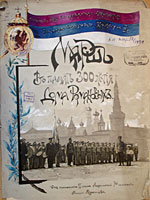Events in the House of Romanov and Musical Gifts
Coronation of the Emperors, their weddings, the birth of heirs, military victories, anniversaries, visits to different cities and countries, the court hunting, miraculous escape from death, and death proper - here's a short list of events that were reflected in the musical compositions of numerous musicians.
Coronation is ranked the first in popularity in this row. As you know, many guests, both Russian and foreign, were invited to this ceremony. All they presented gifts. Among various kinds of presents, music manuscripts were a remarkable portion. The musical compositions kept in the holdings of the National Library of Russia mark the coronation not all Russian Emperors. The presentation manuscripts carry records dedicated to the ceremonies of crowning only Alexander I, Alexander II and Nicholas II.
Most works celebrating the coronation were presented to Alexander II. The ceremony took place not immediately after his accession to the throne. He de facto became the Emperor upon the death of his father in 1855 on 18 February (3 March) 1855. But the coronation took place only on 26 August 26 (7 September), 1856. Therefore, he received gifts twice. In the honour of the beginning of the reign, Alexander was presented with the manuscript of the opera «Oberon» by Carl Maria von Weber, as well as the hymn of praise «Te Deum "Thee, O God, we praise"» by the Director of the Warsaw Opera Jean Quattrini. The coronation also initiated creation and presentation of new multiple musical gifts.
Emperors also received gifts marking wedding parties. As a rule, musical works were dedicated to one of the married couple. Thus, the French polka «Maria Feodorovna» by Carl Sonntag, named after the Empress, was created, of course, in her honour. The mazurka «Honeymoon» by Italian composer Arduino Chiaffarelli was dedicated to Emperor Nicholas II. In the inscription written in the «Polish Wedding [Polonaise]», the Polish composer Nikolai Braniewsky addressed only to Tsarevich Grand Duke Alexander Alexandrovich (the future Emperor Alexander III) without mentioning his wife.
Important state anniversaries, for instance, the 300th anniversary of the Romanov dynasty, were accompanied by music. Celebrations lasted for several months in all Russian cities. The authorities organized acts of charity in favor of poor people: free lunches were distributed for them, houses were built to provide free accommodation for those who could not afford to pay rent, scholarships were given to the poorest students, etc. The Divine Liturgy were celebrated in the churches, prayers and expressions of wishes for long life for the Emperor and his family, and the reigning House were heard. Troops Parades moved along city streets, balls and parties were given, free concerts and performances were held, literary and musical evenings were conducted, festivities were organized.
Numerous works were written in honour this event. Not only professional, adult musicians composed music. One of the composers was a schoolboy Mikhail Bryantsev from the 6th class of the Lodz gymnasium. He not only wrote a march to commemorate the 300th anniversary of the House of Romanov, but designed the manuscript in the original way. The author carefully cut a magazine photography of Nicholas II and Tsarevich Alexei standing before the formation of the Naval Cadets and placed it on the cover against the background of a drawing of the Moscow Kremlin.Two items from the collection are associated with the tradition of courtly hunting. One of them was presented to Emperor Alexander II by the French composer Philippe Duloup. It includes several independent parts, namely: «March» for a wind orchestra, «Fanfare» for voice and piano with a French text: («C'est aujourd'hui chasse a la cour» - «The court is going on a hunt today»). The last part is «Quartet for hunting trumpets»..
Other "hunting" work was composed by Ignatius Malinowski, who is called "the head of a hunting musical sextet" in the text placed on the title page. Its title - the «Greeting from Spala» contained the name of the town in eastern Poland, where the Imperial hunting lodge was located. Here Alexander III and Nicholas II loved to hunt deer. «Marsh (Fanfare) for six hunting horns» was dedicated to the latter Russian Emperor, "a royal hunter"..
A hunting horn mainly was used in giving signals on a hunt to call dogs or send messages to hunting partners. Since the mid 18th century, through the efforts of the chief huntsman Count S. Naryshkin, a hunting horn has a broader role. Naryshkin created a horn orchestra to play simple music. Since that time, staff positions of the Imperial hunting musicians were introduced.There is an opinion that "hunting music was eliminated at the beginning of the reign of Alexander III». Ignatius Malinowski's composition proves the opposite. The manuscript dedicated to Nicholas II contains not only the parts of horns. It also includes an arrangement of scores for piano. Moreover, Malinowski pasted in manuscript 4 photos depicting a six-member horn group.

